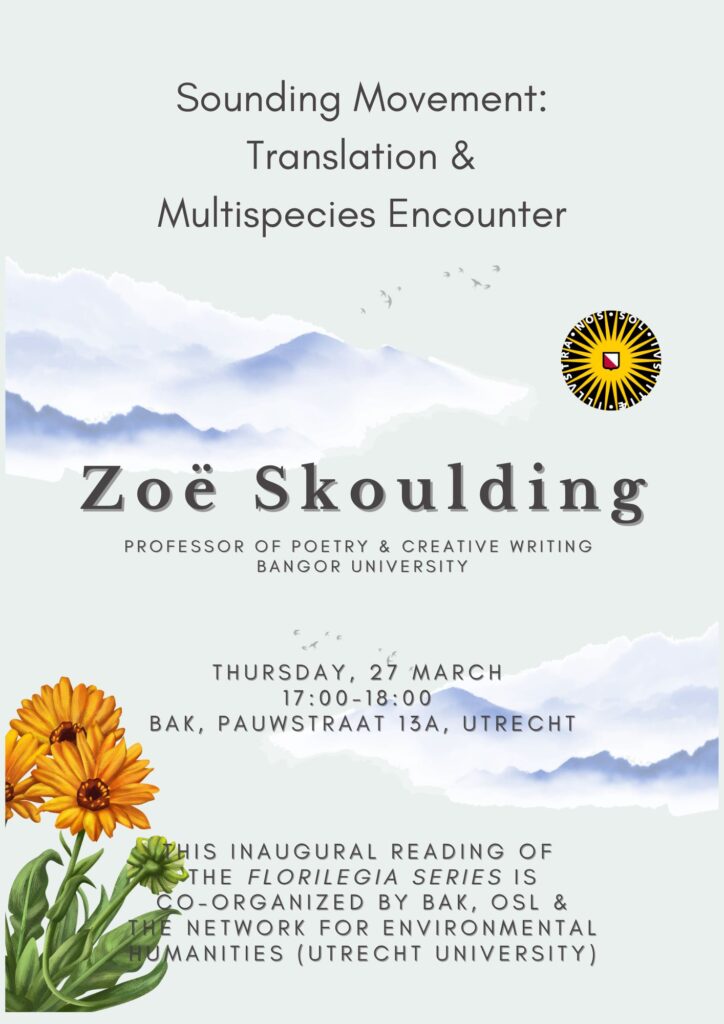Agenda
Sounding Movement: Translation and Multispecies Encounter
In collaboration with the Research Masters program in Comparative Literary Studies and the Network for Environmental Humanities, we welcome Zoë Skoulding – poet, translator, scholar, and Professor of Poetry and Creative Writing at Bangor University, Wales – to Utrecht on Thursday, 27 March, for a poetry reading and discussion. This event will take place at BAK: basis voor actuele kunst (Pauwstraat 13a, Utrecht). Food and refreshments will be served at 17:00; the reading begins at 18:00. The event is free and open to the public.
Sounding movement: translation and multispecies encounter
What happens when we think of our relation to other species via translation? Is translation a useful model in helping us to conceptualise minoritised perspectives, unheard voices and different kinds of embodiment? Or does translation’s emphasis on human language inevitably domesticate our interpretation of other sign systems? This talk and poetry reading will explore possible responses to these questions through a focus on sound and movement on and off the page.

photo credit: John Hollingsworth
Zoë Skoulding is a poet and literary critic interested in translation, sound and ecology. She is Professor of Poetry and Creative Writing at Bangor University. Her latest collection of poems is A Marginal Sea (Carcanet Press, 2022). Her previous collections (published by Seren Books) include The Mirror Trade (2004); Remains of a Future City (2008), shortlisted for Wales Book of the Year; The Museum of Disappearing Sounds (2013), shortlisted for Ted Hughes Award for New Work in Poetry; and Footnotes to Water (2019), which was a Poetry Book Society Recommendation and won the Wales Book of the Year Poetry Award 2020. In 2020 she also published The Celestial Set-Up (Oystercatcher) and A Revolutionary Calendar (Shearsman). She received the Cholmondeley Award from the Society of Authors in 2018 for her body of work in poetry.
Her critical work includes two monographs, Contemporary Women’s Poetry and Urban Space: Experimental Cities (2013), and Poetry & Listening: The Noise of Lyric (2020). She has recently directed Transatlantic Translation: Poetry in Circulation and Practice Across Languages (funded by the Arts and Humanities Research Council, 2020-22), following the network Poetry in Expanded Translation 2017-2018. From 2009 to 2011 she was, in partnership with Literature Across Frontiers, director of Metropoetica, a collaborative project on translation, gender and city space. She was Editor of the international quarterly Poetry Wales 2008-2014 and co-founded the (North) Wales International Poetry Festival in 2012.
This reading/talk is the concluding keynote to a day-long symposium, “Nothing in Words Can Be Complete:” Multispecies, Multilingual Poetics, co-hosted by the Research Masters program in Comparative Literary Studies, Network for Environmental Humanities and the NWO Veni Project Poetry in the Age of Global English.
It is also the inaugural reading of the FLORILEGIA SERIES, an ongoing collaboration by UU’s Network for Environmental Humanities with BAK Basecamp and the Sustainable Humanities group of OSL (Netherlands Research School for Literary Studies). The Florilegia (“bloemlezingen,” “flower-gatherings”) Series features public readings and discussions by international writers working at the intersection of language justice and climate justice through translation and translanguaging. The next reading will be by Erín Moure and Frank Keizer, on 1 May, 17-19:00 (including a communal dinner by b.ASIC a.CTIVIST K.ITCHEN).


